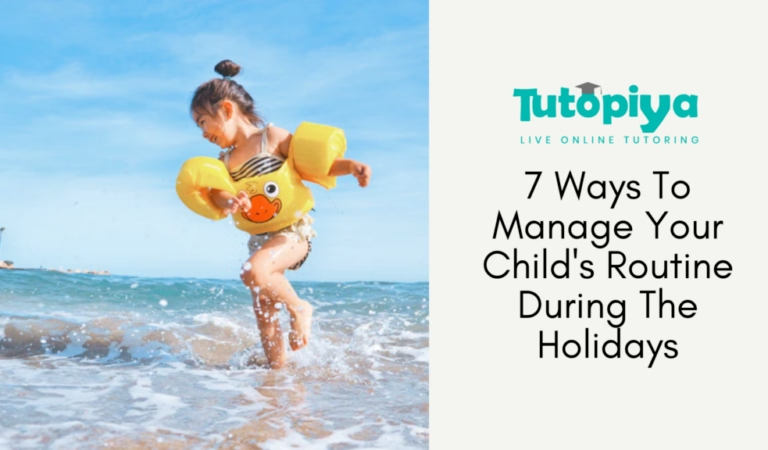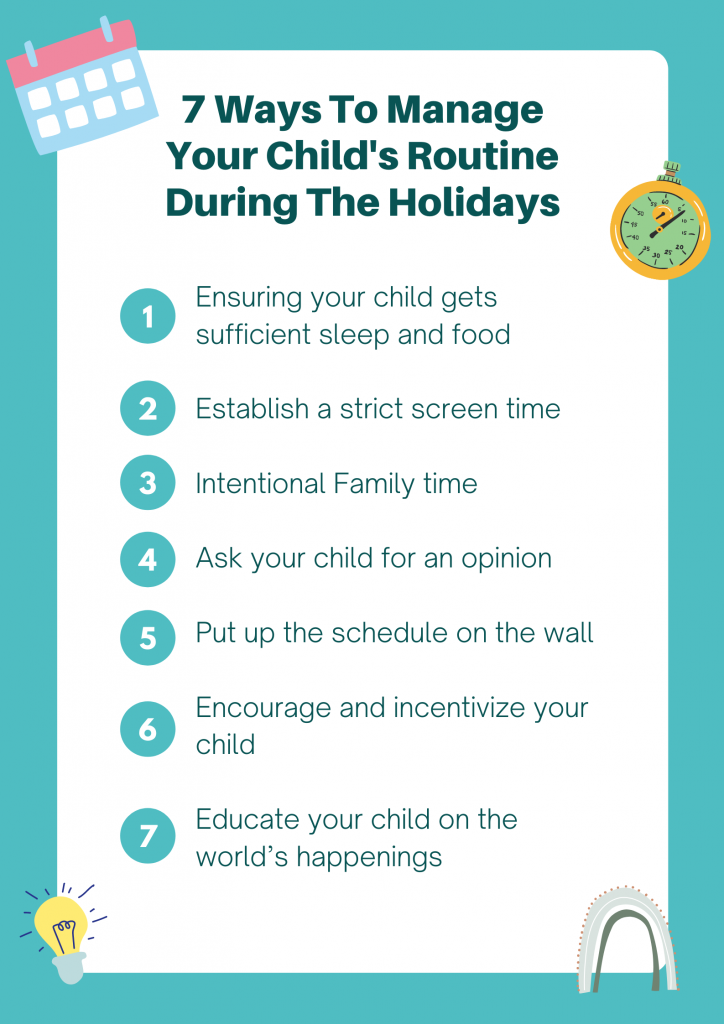
7 Ways To Manage Your Child’s Routine During The Holidays
As school holidays and festive seasons approach, your child will suddenly have lots of spare time and energy. Here are seven practical ways to manage your child’s holiday routine without losing the fun of the break.
7 Ways To Manage Your Child’s Routine During The Holidays
1 – Ensure your child gets sufficient sleep and food
When your child is in school, they have a timetable to follow. They wake up at the same time, follow a similar flow of lessons and go to bed at a predictable hour. Try to keep the momentum going even during the holidays so that returning to school is less disruptive.
Studies suggest the following sleep targets:
| Age | Recommended hours of sleep per 24h |
|---|---|
| 3 – 5 years old | 10 – 13 hours (including naps) |
| 6 – 12 years old | 9 – 12 hours |
| 13 – 18 years old | 8 – 10 hours |
Likewise, maintain regular meal times. A predictable schedule helps your child stay energised and keeps growth on track.
2 – Establish strict yet reasonable screen time
Devices are convenient babysitters, but children still need sunlight, movement and real-life play. Set daily screen limits and guide your child toward outdoor fun or off-screen hobbies. A good rule of thumb is to keep devices away during meals, family time and at least one hour before bedtime.
3 – Build intentional family time
Family time should be built into every holiday routine. Make time to cook dinner together, head to the park for a picnic, or simply stroll through the supermarket aisles chatting about what to buy. Intentional interaction strengthens bonds, keeps communication open and gives parents a refreshing break from work stress.
4 – Ask your child for their opinion
Older children often have clear ideas of what they hope to do during the holidays. Listen, discuss feasibility and co-create plans. Supporting their hobbies or interests gives them ownership over the break and teaches decision-making skills.
5 – Put the schedule on the wall
Visual schedules act as gentle reminders. Post a simple weekly plan on the wall or fridge and have your child check it each morning. Wristwatches, alarms or timers can help younger children know when it is time to move to the next activity.
6 – Encourage and incentivize your child
Positive reinforcement goes a long way. Praise your child when they follow the plan or demonstrate responsibility. When corrections are needed, explain calmly what went wrong and what should happen next. Small rewards—like a trip to their favourite playground—can motivate consistent effort.
7 – Educate your child on the world’s happenings
Use the slower pace of the holidays to talk about current events such as climate change, community issues or inspiring news stories. These conversations expand your child’s worldview and may spark new interests or causes they wish to support.

These seven habits will help your child enjoy a meaningful break while staying in a healthy rhythm. Tutopiya hopes this guide comes in handy for parents looking to instil good routines even during the holidays.
Read also: 4 Useful and Effective Time Management Tips for Students
About the author
I am currently a full-time student studying at a local university in Singapore while freelancing as a writer. I enjoy writing and sharing useful education-related tips with my fellow studying peers. During my leisure time, I enjoy doing creative arts and volunteering work. I am passionate about sharing my experience as a student! ☺
Written by
Eleen Tan
Contributing Writer
Related Articles

When should you start talking to your child about financial management?
Learn essential financial management skills for children with practical tips and activities. Empower your kids with money management knowledge for a brighter future!

Guide to choosing the best online tuition app
Find the best online tuition app for IGCSE, IB, & A-levels. Discover key features & choose wisely for your child's international education success.

7 Tips for Finding a Suitable Math Tutor For Your Child in Singapore
Comprehensive guide and expert insights on educational topics for IGCSE, IB, and international curriculum students.
